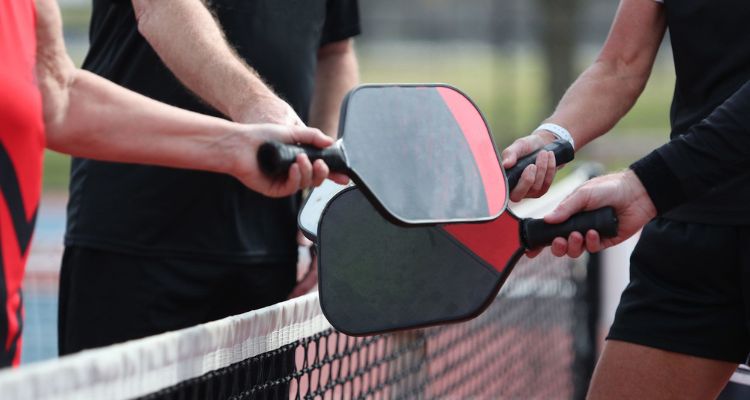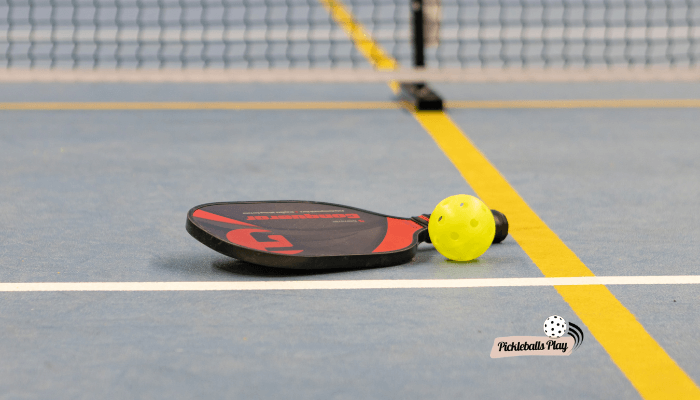Pickleball enthusiasts, gear up!
Today we’re diving deep into the world of paddle materials to help you better understand your game and make informed decisions about your next pickleball paddle purchase. Graphite or fiberglass – which one should you choose? There’s no need to worry; we’ve got you covered.
What Is the Difference Between Graphite & Fiberglass Pickleball Paddles?
Graphite and fiberglass pickleball paddles differ in several ways, including weight, flexibility, cost, pop and spin potential, and durability. Let’s examine each factor in detail:

Weight
When choosing a paddle for a game of pickleball, it’s essential to consider the material it’s made of. Graphite paddles are popular because they are lightweight, making them easier to handle and less tiring to use during extended gameplay.
Flexibility
Graphite paddles are known for their stiffness, which makes them ideal for players who value consistency and accuracy. On the other hand, fiberglass paddles are more flexible, which makes them bouncier and more lively.
Cost
Graphite paddles are of higher quality and durability than fiberglass paddles but are also more expensive. On the other hand, fiberglass paddles are more affordable, making them popular among pickleball players.
Pop and Spin
Graphite paddles have less pop and spin, making them ideal for players prioritizing control and touch over power and spin. Fiberglass paddles have more pop and spin, making them suitable for players who value power and spin over control and touch.
Durability
Graphite paddles are known for being more durable than fiberglass paddles. On the other hand, fiberglass paddles may chip or crack more easily.
Pros and Cons of Each Material
Graphite
Pros:
- More durable than some other materials.
- The graphite paddle is lightweight and easy to maneuver.
- It will provide good power and control.
- It offers a consistent playing experience.
Cons:
- More expensive than some other materials.
- Can be less forgiving and offer less “feel” than some other materials.
- Can be more brittle and prone to cracking than some other materials.
- May not be ideal for players who prefer a softer, more flexible paddle.
Fiberglass

Pros:
- Fiberglass paddles are heavier that provide more power.
- Fiberglass paddles are more affordable in price.
- Fiberglass paddles are good for beginners.
- It can be found in a variety of shapes and sizes.
Cons:
- Less durable than other materials, can chip or crack more easily.
- May need more maintenance to keep it in proper condition.
- May not have as much “feel” as other materials.
- Not as common as other materials and may have fewer options to choose from.
FAQs
How to choose pickleball equipment?
Consider your play style when choosing pickleball equipment. Recreational play usually requires a beginner paddle. A paddle with an extended sweet spot and a wider face may be best for more competitive players. Indoor balls are typically lighter and designed for slower play than outdoor balls; choose balls according to the game type. Pickleball players should also wear protective gear, such as eyewear, for safety.
How to buy a good pickleball racquet?
When buying a pickleball racquet, you should consider the following factors: weight, size, string pattern, and type of grip. The racquet’s weight should be comfortable for your skill level and size; a heavier racquet will provide more power but may be challenging to maneuver. Size is also key; you want it to fit your hand comfortably. The string pattern refers to how dense the strings are in the racquet head – denser strings offer more control and spin but affect power. Lastly, you’ll want to choose a grip type that fits your hand comfortably and allows maximum control when playing.
How do you clean a fiberglass pickleball paddle?
To clean a fiberglass pickleball paddle, use a damp cloth to wipe away any dust or dirt on the surface of the paddle. A mild soap and water solution can gently scrub away any stuck-on debris. Rinse off with clear water and dry thoroughly with a soft cloth before storing.
Conclusion
After exploring the differences between graphite and fiberglass pickleball paddles, it’s clear that both materials have their unique strengths and weaknesses. Choosing between graphite and fiberglass pickleball paddles depends on your playing style and needs as a player. Considering factors like budget, skill level, and playing style preferences is essential before deciding. No matter which material you choose in your next purchase of a pickleball paddle – we hope this article has helped you make an informed decision!



